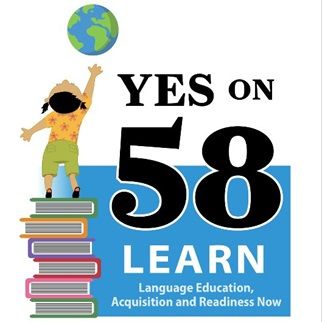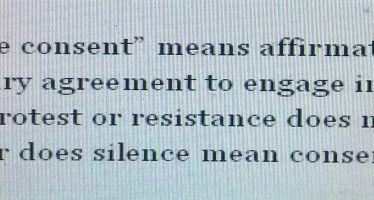Bilingual education fight plays out off stage
 California’s crowded Nov. 8 ballot is leading the media to perform a kind of triage and focus on only a handful of the measures deemed most crucial. This has lead to a spotlight on proposals to make it easier for some prison inmates to gain parole (Proposition 57), to legalize adults’ recreational use of marijuana (Proposition 64) and to either scrap the death penalty (Proposition 62) or streamline death penalty appeals (Proposition 64).
California’s crowded Nov. 8 ballot is leading the media to perform a kind of triage and focus on only a handful of the measures deemed most crucial. This has lead to a spotlight on proposals to make it easier for some prison inmates to gain parole (Proposition 57), to legalize adults’ recreational use of marijuana (Proposition 64) and to either scrap the death penalty (Proposition 62) or streamline death penalty appeals (Proposition 64).
This approach may make sense in a year with 17 state ballot measures. But it is a source of great frustration for advocates or opponents of other measures involving important issues.
A prime example is Proposition 58, which would return bilingual education to California schools 18 years after it was scrapped by Proposition 227. The measure was put on the ballot by the Legislature at the behest of state Sen. Ricardo Lara, D-Bell Garden. It would allow schools to enroll students in Spanish-only or other language classes without parental consent. Presently, parents must sign a waiver for students to receive such instruction.
With the strong support of teachers unions and the state Democratic Party, Lara has framed the measure as being about creating a cosmopolitan bilingual workforce. He notes the measure allows the Legislature to modify or eliminate it if it isn’t working well. And he cites provisions in the measure that would ensure it avoids the biggest problem of the previous version of bilingual education in California: students never learning English, spending their school days hearing only Spanish.
“All kids should learn English. What we’re questioning is the method we use to get there,” he told the Bay Area News Group.
Ballot rebuttal knocks claim 227 was successful
The ballot argument for Proposition 58 frames the measure as being about improving the instruction of English. The pro-58 side’s rebuttal argument also questions claims that Proposition 227 was broadly successful, citing a survey showing test scores didn’t improve in a five-year span after 227’s approval.
This deeply frustrates Ken Noonan, the former Oceanside Unified superintendent who co-signed the ballot argument against Proposition 58 along with Ron Unz, the Silicon Valley entrepreneur who sponsored Proposition 227 in 1998. Noonan was a skeptic of 227 until he saw how quickly Spanish-speaking students made gains in English-immersion classes.
“Why screw up a good thing?” Noonan told the Sacramento Bee in August. “This is working. This is working so well.”
While test scores may not present a clear picture of failure or success, some other metrics support the idea that Proposition 227 has been successful, starting with the sharp decline in the number of Latinos who quit high school before graduation.
In 1999, according to methodology developed by the Urban Institute, the graduation rate for California Hispanics was 58 percent. (Official state records from before 2005 are considered unreliable. A sweeping study released that year by the UCLA Civil Rights Project concluded that state metrics sharply exaggerated the percentage of students graduating, leading to major reforms.)
According to the statistics released by the state Department of Education earlier this year, the rate of Hispanic graduation reached 78.5 percent in 2015, an all-time high.
Nonetheless, Lara and the well-funded yes on Prop. 57 campaign appear to be coasting to victory in polls. In an interview with the San Francisco Chronicle, he depicted his measure as a triumph of common sense.
The senator said California should not have “non-educators dictating how we teach, in a one-size-fits-all approach. We should give that right back to the teachers, who are the experts.”
Chris Reed
Chris Reed is a regular contributor to Cal Watchdog. Reed is an editorial writer for U-T San Diego. Before joining the U-T in July 2005, he was the opinion-page columns editor and wrote the featured weekly Unspin column for The Orange County Register. Reed was on the national board of the Association of Opinion Page Editors from 2003-2005. From 2000 to 2005, Reed made more than 100 appearances as a featured news analyst on Los Angeles-area National Public Radio affiliate KPCC-FM. From 1990 to 1998, Reed was an editor, metro columnist and film critic at the Inland Valley Daily Bulletin in Ontario. Reed has a political science degree from the University of Hawaii (Hilo campus), where he edited the student newspaper, the Vulcan News, his senior year. He is on Twitter: @chrisreed99.
Related Articles
On Wisconsin! On to CA!
John Seiler: The best part about the turmoil in Wisconsin is that the government there is jammed up. AP reports:
Update: Moorlach wins, Glazer advances to run-off for CA Senate
Update: 8 am, March 18, 2015: With 100 percent of the precincts in, according to the Secretary of State, John
Noted liberal pundit: CA ‘affirmative consent’ law a ‘radical experiment’
The problem of sexual violence and abuse on college campuses is a huge one. But California’s new “affirmative consent law,”




